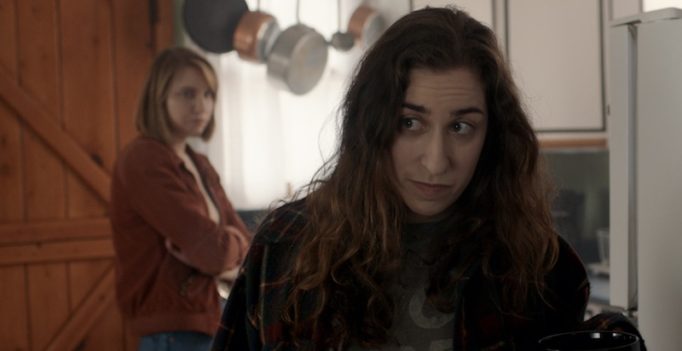Written by Jenny Lester and directed by Amy Northup, What She Said dubs itself a “feminist dark comedy” – an apt description for a film that combines dry humour with a frank examination of sexual assault and its consequences.
When Sam, played by Jenny Lester, tells her brother she plans on dropping charges against her rapist, her friends and family gather at a remote cabin to stage a thanksgiving intervention. Some are outraged that Sam would consider letting the guy off the hook, while others are committed to supporting her and her decision. Sam’s rage and frustration is rarely explosive; instead, it simmers just beneath the surface. Especially in a comedy, it would be easy to reduce Sam to a caricature, a mere bundle of survivor stereotypes. Refreshingly, Lester’s performance is grounded and sincere, offering a relatable portrait of a woman navigating her trauma alongside other’s expectations.
While Lester’s acting is solid, her script suffers from an over-load of exposition and dialogue that seems more concerned with debating the ethics of Sam’s decision than with nuanced characterization. Unsurprisingly, What She Said is heavy-handed in its messaging and spells out its position and thesis ad nauseum. Within a political and social climate where survivors must fight to be believed and listened to, I can understand why the filmmakers may have felt they couldn’t leave room for audience interpretation or ethical ambiguity. That said, the result feels hollow in places. Every bit of dialogue is either direct exposition or an argument, leaving little room for the audience to get a feel for the characters and their relationships. When it comes to engaging viewers on an emotional level, showing is usually more effective than telling, but What She Said seems reluctant to show much of anything.
The cinematography is simple, and almost minimalist in its approach. Similarly, the sets are limited. Though many scenes take place outdoors, What She Said doesn’t concern itself with lush landscapes or indulgent, lingering shots of natural beauty. Instead, the focus is almost exclusively on the characters and dialogue with medium-long shots, often crowded, that allow for very little movement or physicality from the actors. It is a nice reflection of Sam’s inner world and her feelings of suffocation and stagnancy, but the effect is also, for better or worse, rather theatrical. There were more than a few points where it seemed that What She Said could just as easily have been a stage play as a film. This isn’t necessarily a bad thing, but it does suggest that more could have been done, visually, to add to the story.
What She Said isn’t just about Sam and her experience. One of the most powerful aspects of this film is that it shows how sexual assault impacts not only an individual, but also their loved ones. In the end, What She Said isn’t a perfect film, but it is an important one. Taking on such heavy subject matter in a comedy, let alone a debut feature, is ambitious and both Lester and Northup deserve praise for pulling off a tricky balancing act.
**********
Do You Tweet? Follow These Tweeple:
Shannon Page: @ShannonEvePage





Be the first to comment